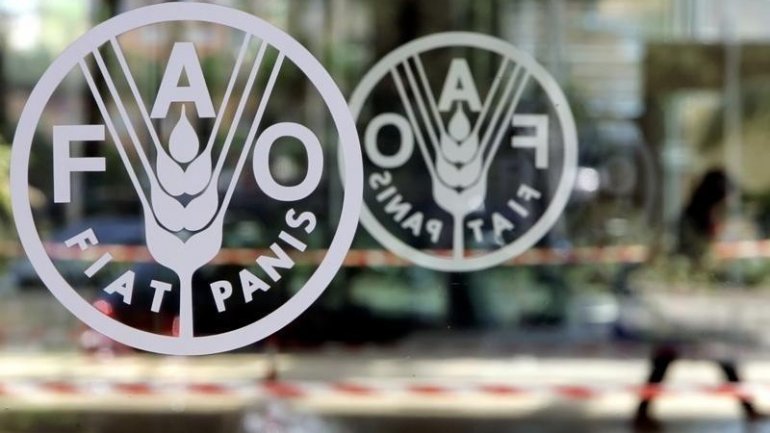FAO launches project worth $125,000 dedicated to agroecology in Moldova
 foto: The logo of the Food and Agriculture Organisation (FAO) is seen on the door of the headquarters in Rome August 31, 2005. REUTERS/Alessandro Bianchi
foto: The logo of the Food and Agriculture Organisation (FAO) is seen on the door of the headquarters in Rome August 31, 2005. REUTERS/Alessandro Bianchi
The United Nations Food and Agriculture Organization (FAO) together with state authorities has launched a pilot project named "Promoting agro-ecological methods and innovations in the design and management of sustainable food systems in Moldova".
There was a consultation meeting in the event between representative of Ministry of Agriculture, Regional Development and Environment (MADRM), farmers associations and other beneficiaries.
Accordingly, the organization implementing the project is the National Federation of Farmers of Moldova AGROinform.
The project involves revising policies, strategies regarding actual agro-ecological situation at national level, moreover, formulating recommendations on improving and updating documents dedicated to the sustainable agriculture as well as food security.
"We're pleased to support FAO's initiative to promote the agro-ecological approach in Moldova. Agroecology is a necessity to guarantee our sustainable agriculture and food system.
"Importantly, this project is further step to ensure a stable yield of production and consolidation economic viability of rural areas, while being a commitment to biodiversity protection and sustainable management of natural resources, "said Deputy Minister of Agriculture, Regional Development and Environment Ion Parea.
"This project is a continuation of our efforts to ensure a sustainable and resistant food system in Moldova. We aim to sustainably enhance plant production and promote agro-ecological approaches in rural areas and agricultural communities by improving technical capacities, policies and strategies.
"It is a pilot project and we hope it will be a successful history that can be further developed and exported to other countries in the region, "said Avetik Nersisyan, representative of the FAO Regional Office.
Another important component of the project includes field studies to identify the best cultivation systems in different agro-ecological areas for the adoption and promotion of conservative agriculture and integrated plant protection.
Following studies, 10 farmer schools will be established at national level to promote conservative farming and innovative methods of integrated plant protection. Within these schools, over 40 training sessions participated by more than 600 farmers are planned.
"We believe that in this process, farmers are both the main beneficiaries and the main actors. In order to ensure agriculture based on agroecological principles, the active involvement of farmers in this process is essential and therefore our efforts are focused on information, training and support the small and medium-sized farmers, "said Iurie Hurmuzachi, deputy director AGROinform, the local implementation organization.
In order to promote and raise awareness of the need for agroecology approaches in agriculture, a number of materials will be developed to inform farmers about new techniques and initiatives such as networks connecting farmers with researchers to develop and strengthen local expertise in the agro-ecological approach and the production of sustainable crops.
Also, in April 2018, the MADRM representatives will have the opportunity to participate in the second International Symposium on Agroecology for Food Security and Nutrition, held in Rome.
According to the FAO, agroecology is based on the application of ecological concepts and principles to optimize interactions between humans and the environment, taking into account the social aspects that need to be addressed to achieve a fair and sustainable food system. It can be considered a scientific discipline, a set of practices and a social process. By creating synergies, agroecology can support food production and food security, while preserving the ecosystem and biodiversity that are essential for sustainable agriculture. Agroecology can play an important role in developing resistance and adapting to climate change.
In 2017, the FAO launched the "Agroecology Knowledge Hub", which aims to promote the benefits of agroecology by strengthening the empirical database on the subject by sharing examples of countries' policies, strategies and experiences.
The pilot project will end in June 2018 and has a budget of $125,000.
- Moldovan agricultural output to witness gentle decline
- Global Warming worries Moldova's farmers
- 11 New anti-hail stations launched to protect agriculture against weather hazards
- IFC to offer Moldova 3,2 million USD to improve agriculture industries
- Japan offers $4.8M to boost Moldova's conservative agriculture
- Agriculture snaps up new tech devices